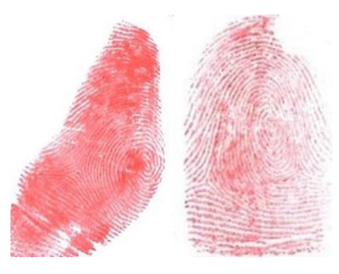Abstract
Dermatoglyphics is the scientific study of the epidermal ridge configuration of hands and feet. Digital dermatoglyphics are unique and specific evidence that greatly contribute to personal identification in forensic science. Hand dominance is an uneven distribution of fine motor skills between the left and right hands. The objective of the study is to observe gender variation in fingerprinting pattern of thumb and index fingers and also to determine the relationship between handedness and digital dermatoglyphics. The study was conducted at Saveetha Medical College and Hospital. Ethical clearance for this study was obtained from the Ethical Clearance Committee of the institute. This cross-sectional study was conducted on a sample size of 500 students, of 18-25 years of age, pursuing their education in the constituent courses of Saveetha Medical College. Handedness was assessed using the Edinburgh Handedness Inventory. The fingerprints were obtained by a 'Lipstick' method. The prints were studied using a magnifying lens. The various patterns of fingerprints were observed, categorized and compared according to standard guidelines. A total of 500 students were studied. There were 228 right-handed males, 18 left-handed males, 233 right-handed females and 21 left-handed females. In right-handed males, the thumb showed a predominance of loop pattern in (57.9 %) study participants and in right-handed females loop pattern was observed in thumb was 61.1%. In the right-handed female thumb, loops were predominant patterns in 70.8. Arch pattern is distinctively absent for both right and left-handed thumb in both males and females. 19.3 % of female right-hander had arch patterns predominantly in their index finger. Widespread interest is developing in the field of medicine and forensic science with regard to epidermal ridges. Our present study was able to observe gender variations and variations in the dermatoglyphic pattern in the right and left-hander for the first two digits.
Full text article
Authors

This work is licensed under a Creative Commons Attribution-NonCommercial-NoDerivatives 4.0 International License.

